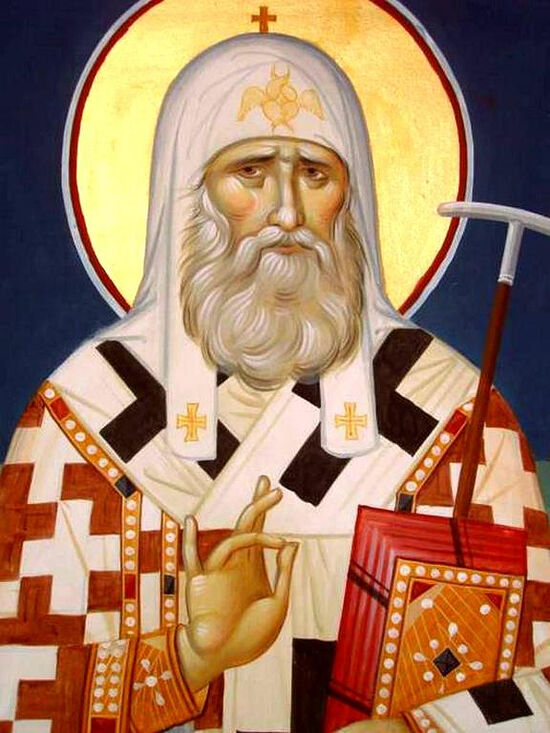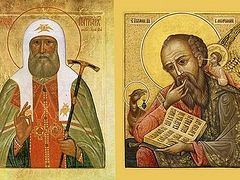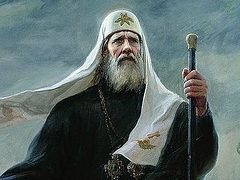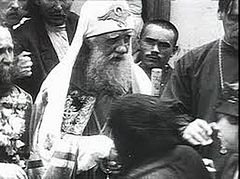On October 9, the Russian Orthodox Church celebrates the memory and glorification day of St. Tikhon, Patriarch of Moscow and all Russia. We offer our readers a theological-philological commentary to the troparion of this feast.
 St. Tikhon (Bellavin), Patriarch of Moscow and All Russia.
St. Tikhon (Bellavin), Patriarch of Moscow and All Russia.
St. Tikhon (Bellavin) was chosen Patriarch of Moscow and all Russia after the restoration of Patriarchy at the All-Russia Local Council, August 15, 1917. On November 21 (December 4 according to the new calendar) his enthronement took place in the Dormition Cathedral in the Moscow Kremlin.
Without a doubt, this was a significant event for the Russian Church, but it also placed a huge responsibility upon St. Tikhon, because persecutions against the Church had just begun, and to accept the rule of the Russian Orthodox Church during that onerous period was a true ascetic labor.
And truly, all of St. Tikhon’s life was a confession of Christ. He strove with all his strength to preserve the purity of Orthodoxy from attacks by the soviet regime.
The troparion to St. Tikhon sounds like this:
Troparion:
Let us praise Tikhon, the patriarch of all Russia, / and enlightener of North America / an ardent follower of the Apostolic traditions, / and good pastor of the Church of Christ. / Who was elected by divine providence, / and laid down his life for his sheep. / Let us sing to him with faith and hope, / and ask for his hierarchical intercessions: / Keep the church in Russia in tranquility, / and the church in North America in peace. / Gather her scattered children into one flock, / bring to repentance those who have renounced the True Faith, / preserve our lands from civil strife, / and entreat God’s peace for all people! [From OCA.org].
Ardent follower of Apostolic Traditions
At the beginning of the troparion, St. Tikhon is called an “ardent follower of Apostolic traditions”. The term “traditions” has different meanings. One of them is “passing on by inheritance.”1 And truly we can suppose that we are not prepared to die for just any tradition, but only for that Tradition, which is passed on through the apostles by the Holy Spirit, for the Tradition that saves man from death.
It would seem to be a paradoxical situation: A man who goes to his death for the sake of apostolic Tradition acquires life. This finds a response in the words of the Savior:
For whosoever will save his life shall lose it: and whosoever will lose his life for my sake shall find it (Mt. 16:25.
St. John Chrysostom writes:
You should always be ready for death. For even now a terrible battle is already breaking out. Therefore, do not sit at home but go out to battle; if you fall in the battle, you will come to life in that same moment.2
And he continues this thought, showing that those warriors who fight for earthly kings, who are unable to give them resurrection, become invincible in the eyes of their enemies. And even more invincible is a person if he fights for Christ, the Master of life, Who will resurrect him on the last day.
Apostolic Tradition is the Tradition of Jesus Christ, which is illumined by the Holy Spirit and leads the Body of the Church to the Lord. St. Tikhon was just such a zealot of precisely this Tradition, which enlivens a person and does not allow him to die. Vladimir Lossky writes:
We can give a precise definition of Tradition by saying that it is the life that communicates to each member of Christ’s Body the ability to hear, accept, and recognize the Truth in the light that is inherent in it, and not in the natural light of human reason.3
Good pastor of the Church of Christ
Further in the troparion St. Tikhon is called a “good pastor of the Church of Christ”. This is a gospel image, for Christ also calls Himself a Pastor in the parable of the good shepherd and the hireling: I am the good shepherd: the good shepherd giveth his life for the sheep (Jn.10:11).
In the difficult period for the Church, the saint accepted the rule of the Church, understanding that a time has begun of persecution, betrayal, and slander; but the true pastor does not abandon his flock and even gives his life for it so that the wolves would not steal it. That is just what happened. St. Tikhon gave his life so that the schismatics and heretics could not corrupt Christian souls; and even up to his death he did all he could to make it possible for people to preserve the Orthodox faith.
Elected by divine Providence
In the troparion is reflected the moment of Metropolitan Tikhon’s election to the patriarchal throne: “Let us praise Tikhon, the patriarch of all Russia… elected by divine Providence.”
After four rounds of votes, the All-Russia Council chose the candidates for the Primatial Throne: Archbishop Anthony (Khrapovitsky) of Kharkov, Archbishop Arseny (Stadnitsky) of Novgorod, and Metropolitan Tikhon of Moscow. The Patriarch was to chosen by drawing lots, and the lot fell to Metropolitan Tikhon.
In the Old Testament book of Proverbs it says that to decide important matters a lot was cast, and it was considered that this decision was from the Lord:
The lot is cast into the lap; but the whole disposing thereof is of the Lord (Prov. 16:33).
In the New Testament, when a new apostle was chosen to take the place of the fallen Judas, they were also guided by casting lots. The lot of service is what is given from the Lord, and a man decides whether or not to accept it:
Men and brethren, this scripture must needs have been fulfilled, which the Holy Ghost by the mouth of David spake before concerning Judas, which was guide to them that took Jesus. For he was numbered with us, and had obtained part of this ministry (Acts 1:16–17).
The word “part” has the following meaning: “lot, fate, portion, piece”. Thus, St. Tikhon accepted the lot of service that presupposed deprivation and even death, of which the saint was perfectly aware, but nevertheless accepted the divine lot and submitted to it.
At the end of the troparion we address the saint with a whole series of prayerful supplications. We ask him to preserve the Russian Church in peace, to return those who have fallen from the Orthodox faith to its Life-creating Source, to keep peace in the country, and to ask God for the grace to acquire peace.
***
St. Tikhon became Patriarch in a difficult time for Russia, when it became clear just who are the Church’s true children, and who are its betrayers.
After 2000 years, the Church shines with its holy martyrs, who were ready to die for Christ and not betray Him. St. Tikhon is the true pastor of his children, for he did not refuse them and did not refuse the lot that fell to him, which was confession of Christ in the years of persecution, and death at the hands of persecutors. As a reward the Lord glorified him among the hosts of saints.



